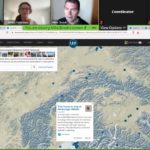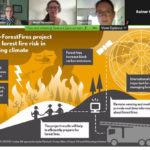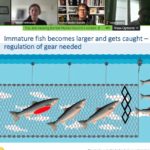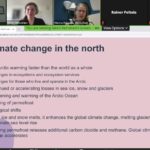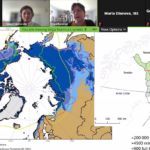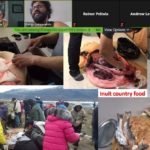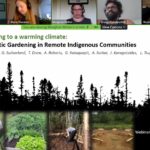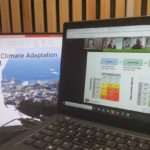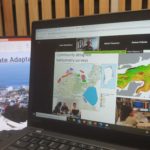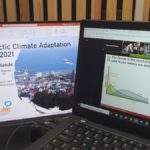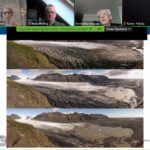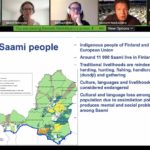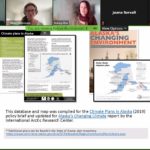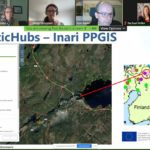In Spring and early Summer 2021, the ACAF project organized a series of webinars with all Arctic countries. Starting with Norway in late April and ending with the United States in mid-July, our webinar series “visited” all Arctic countries one by one, except Greenland and Faroe Islands were invited to a joint event.
The webinars were bilateral in the sense that in each webinar, the program consisted of presentations from Finland and the country “visited”. However, the events were open to all interested, irrespective of home country.
Originally, our aim had been to organize the events largely as physical meetings, but due to the pandemic, the webinars were organized entirely online. Even if meeting others in person cannot fully be replaced by online meetings, we managed to make new friends in all parts of the pan-Arctic region from the comfort of our (home) offices. The webinar participants represented universities and research institutes, indigenous organizations, ministries, governmental advisory groups on climate adaptation, local and regional authorities, NGOs, and many more. In creating contacts across the pan-Arctic region and in search for good practices on Arctic climate adaptation based on academic research, our bilateral webinar series encompassed elements of science diplomacy.
Adaptation to climate change is essentially tied to local and regional conditions, including the experienced and expected climatic changes, the vulnerabilities and adaptive capacities of communities, as well as the visions that the regions, cities and villages have in mind for their future. This was strongly reflected also in our webinars: while some themes like food security were discussed in all of the webinars in one way or another, in the events with Iceland, Norway, Greenland and Faroe Islands, fisheries and aquaculture were the most central topic. In the events with Canada and the United States (Alaska), also Arctic agriculture and gardening were widely discussed. Reindeer herding was an important topic in the events of Norway, Sweden, and Russia. (Finland’s webinar had already been organized in October 2020, see information here in Finnish). Also urban adaptation to climate change, tourism, citizen science, bioeconomy, forestry, mining, berries, energy issues including wind power and oil drilling, and snow security were covered in the presentations, reflecting the livelihoods and other themes that are important concerning climate change adaptation in each Arctic country. Indigenous peoples’ organisations’ work on climate adaptation, food security and food sovereignty were highlighted in several of the webinars.
In the breakout room discussions, the webinar participants discussed successes in Arctic climate adaptation, as well as barriers that slow down adaptation work. Innovations such as map-based tools, citizen science, virtual tourism, ways of visualizing climate change, nature-based solutions, and climate services as decision-support tools were listed.
Besides content related learning, another purpose of the webinar series, following the goals of the ACAF project, was also to create connections between people and organizations that work on climate change adaptation in different parts of the Arctic. Importantly, several networks and Arctic research institutes were introduced, such as ArcticNet in Canada, and Noradapt in Norway. In many of the webinars, relevant research projects like ArcticHubs, JustNorth, Blue-Action, CHARTER, ClimeFish and CLIMINI were highlighted. Moreover, the work of the Barents Euro-Arctic Council on climate change was introduced in two events.
The bilateral webinar series was the first step towards establishing the International Arctic Climate Adaptation network, to which many of the webinar participants have already joined. We hope that the network members can spread word about the network and invite their colleagues to join, too. The network is open to anyone interested in Arctic climate adaptation.
As the one of the next steps in building the Arctic climate adaptation network, all network members will be invited to the thematic webinars that are planned to take place in the Autumn 2021. In the breakout room discussions, we gathered also other ideas and suggestions on the working forms for the network. These include a variety of activities and working forms that help people to find collaborators around specific themes from specific Arctic countries.
In fact, besides the International Arctic Climate Adaptation network, discussions on collaboration between organizations and researchers have already been initiated and will hopefully result as interesting research projects with high societal relevance. At best, research can support Arctic communities with adaptation to climate change, for instance by providing knowledge needed for decision-making on adaptation, and by helping spread the word about innovations and good practices on climate adaptation from across the pan-Arctic region.
I would like to extend my thanks to all speakers and other webinar participants. Your contributions – including your presentations and the active discussions – made the webinars so interesting! My warmest thanks also to the ACAF team members for their contributions in organizing the webinar series.
Ilona Mettiäinen
ACAF project coordinator 1.2.-31.7.2021 (during Jaana Sorvali’s leave of absence)

